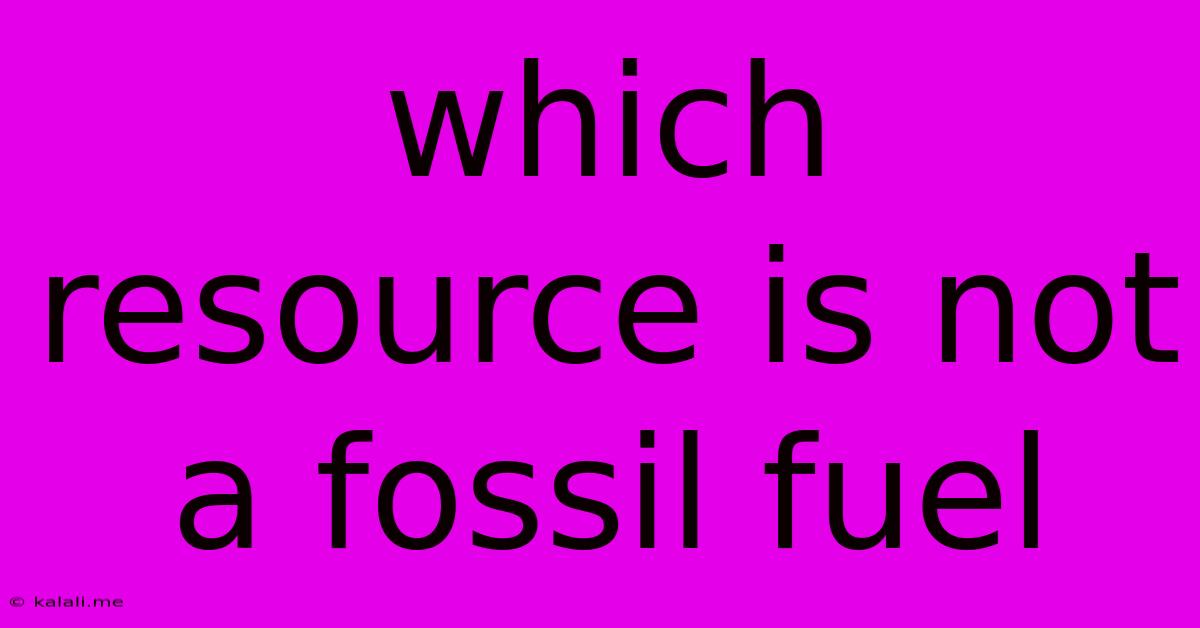Which Resource Is Not A Fossil Fuel
Kalali
Jun 16, 2025 · 3 min read

Table of Contents
Which Resource is Not a Fossil Fuel? Understanding Renewable and Non-Renewable Energy
Fossil fuels, the cornerstones of modern energy production for centuries, are finite resources formed from the remains of ancient organisms. Their combustion releases greenhouse gases, significantly impacting our climate. Understanding what isn't a fossil fuel is crucial for transitioning to a sustainable energy future. This article will clarify which resources fall outside this category and explore their significance in the global energy landscape.
What are Fossil Fuels?
Before identifying non-fossil fuel resources, let's quickly review what constitutes a fossil fuel. These are naturally occurring hydrocarbons, primarily:
- Coal: Formed from ancient plant matter.
- Oil (Petroleum): Formed from ancient marine organisms.
- Natural Gas: Primarily methane, often found alongside oil.
These fuels are non-renewable because their formation takes millions of years, far exceeding the rate of human consumption.
Resources That Are NOT Fossil Fuels:
Numerous resources provide energy without relying on fossilized organic matter. These include:
1. Solar Energy
Harnessing the sun's radiant energy through photovoltaic cells or concentrated solar power (CSP) systems generates electricity without emitting greenhouse gases during operation. This clean and abundant resource is readily available in many parts of the world, although its intermittency requires energy storage solutions or grid integration strategies. Advances in solar panel technology continue to improve efficiency and reduce costs, making solar power increasingly competitive.
2. Wind Energy
Wind turbines convert the kinetic energy of wind into electricity. This renewable resource offers a scalable and relatively low-impact way to generate power, particularly in areas with consistent wind patterns. Offshore wind farms, while demanding higher initial investments, often benefit from stronger and more consistent winds. Wind energy is experiencing significant growth globally, contributing to a cleaner energy mix.
3. Hydropower
Utilizing the energy of flowing water to generate electricity, hydropower is a well-established renewable energy source. Hydroelectric dams create reservoirs and harness the potential energy of water to drive turbines. While offering reliable baseload power, hydropower projects can have significant environmental impacts, including habitat alteration and disruption to river ecosystems. Careful site selection and mitigation strategies are crucial for sustainable hydropower development.
4. Geothermal Energy
Harnessing the heat from the Earth's interior, geothermal energy provides a consistent and reliable source of power. Geothermal power plants utilize steam or hot water from underground reservoirs to generate electricity. Geothermal energy also finds applications in direct heating and cooling systems, offering sustainable solutions for building energy needs.
5. Biomass Energy
Biomass refers to organic matter derived from plants and animals, such as wood, agricultural residues, and dedicated energy crops. Burning biomass releases energy, although it also emits greenhouse gases. Sustainable biomass energy relies on responsible forest management and crop production practices to ensure its environmental sustainability. Advanced biofuels, produced from algae or other sources, aim to reduce greenhouse gas emissions further.
6. Nuclear Energy
Nuclear power plants utilize nuclear fission to generate electricity. While not a renewable resource in the strictest sense (uranium is a finite resource), nuclear power plants generate electricity without emitting greenhouse gases during operation. However, concerns about nuclear waste disposal and the potential for accidents remain important considerations.
In conclusion, a wide array of resources offer viable alternatives to fossil fuels. While each has its own advantages and drawbacks, the transition to a cleaner and more sustainable energy future relies heavily on embracing these non-fossil fuel alternatives and developing efficient and responsible energy technologies.
Latest Posts
Latest Posts
-
How To Create Clickable Image In Html
Jun 16, 2025
-
What Are The Factors Of 121
Jun 16, 2025
-
What Is A Theme Of The Passage
Jun 16, 2025
-
A Company That Provides Access To The Internet
Jun 16, 2025
-
Which Word Is Closest In Meaning To The Underlined Word
Jun 16, 2025
Related Post
Thank you for visiting our website which covers about Which Resource Is Not A Fossil Fuel . We hope the information provided has been useful to you. Feel free to contact us if you have any questions or need further assistance. See you next time and don't miss to bookmark.